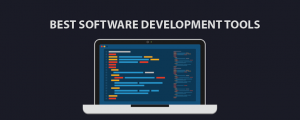
5 must have tools for a Software Developer
Developer tools are essential for software development because they simplify and automate many of the complex and time-consuming tasks that developers must perform. They enable developers to write better code, more efficiently, and with fewer errors. Some of the key reasons why developers tools are important include:
-
Increased productivity: Developers tools can automate repetitive tasks and simplify complex processes, freeing up developers to focus on more important work. This can help increase productivity and reduce the time it takes to develop software.
-
Improved code quality: Developers tools can help catch errors, enforce coding standards, and ensure consistency across projects. This can help improve the overall quality of code and reduce the likelihood of bugs and other issues.
-
Enhanced collaboration: Developers tools can facilitate collaboration between team members by providing a common platform for code sharing, version control, and issue tracking. This can help streamline development workflows and improve communication.
-
Greater efficiency: Developers tools can help streamline development workflows and reduce the time it takes to complete tasks. This can lead to faster development cycles and more efficient use of resources.
Overall, developers tools are crucial for software development because they can help improve productivity, quality, collaboration, and efficiency. Here are some of the tools that a software developer must have.
Integrated Development Environment (IDE): An IDE is a software application that provides comprehensive facilities for software development, including tools for writing, testing, and debugging code. Some popular IDEs include Visual Studio Code, IntelliJ IDEA, and Eclipse.
Version Control System (VCS): A VCS is a software tool that manages changes to source code over time. It allows developers to track changes, collaborate with others, and roll back to earlier versions if needed. Git is a popular VCS used by many developers.
Code Editor: A code editor is a tool used by developers to write and edit code. It offers features like syntax highlighting, code completion, and formatting. Popular code editors include Sublime Text, Atom, and Notepad++.
Debugger: A debugger is a tool that helps developers find and fix bugs in their code. It allows developers to step through their code line by line and inspect the values of variables at each step. Visual Studio Debugger and GDB are popular debuggers.
Package Manager: A package manager is a tool that automates the process of installing, updating, and removing software packages. It saves developers time by managing dependencies and ensuring that all required packages are installed. Popular package managers include npm, pip, and Homebrew.
Integrated Development Environment
An Integrated Development Environment (IDE) is a software application that provides a comprehensive environment for software development. An IDE typically includes a code editor, a debugger, and tools for managing source code, building and testing applications, and deploying software.
An IDE makes it easier for developers to write, test, and debug code, as it provides a single environment for all of these tasks. IDEs can be customized to suit different programming languages and development workflows. Many IDEs also support integration with third-party tools and services, such as version control systems and cloud platforms.
Some popular IDEs include:
-
Visual Studio Code: A lightweight, open-source IDE that supports multiple programming languages and platforms.
-
IntelliJ IDEA: A popular IDE for Java development, with support for other languages like Kotlin, Python, and JavaScript.
-
Eclipse: A widely-used, open-source IDE with support for many programming languages and platforms.
-
PyCharm: An IDE specifically designed for Python development, with features for web development, scientific computing, and more.
-
Xcode: An IDE for macOS and iOS development, with support for Swift and Objective-C.
Overall, an IDE can be a valuable tool for developers of all skill levels, as it can streamline the development process and improve productivity.
Version Control System
A Version Control System (VCS) is a software tool that helps developers manage changes to source code over time. A VCS allows developers to track changes, collaborate with others, and roll back to earlier versions if needed.
The main advantages of using a VCS are:
-
Collaboration: A VCS allows multiple developers to work on the same codebase simultaneously, without interfering with each other’s work. Developers can work on their own branches of the codebase, and then merge their changes back into the main branch when they’re ready.
-
Versioning: A VCS tracks changes to the codebase over time, creating a history of every change that has been made. This makes it easy to roll back to earlier versions of the code, or to compare different versions of the code to see what has changed.
-
Backup and recovery: By storing code in a VCS, developers can ensure that their work is backed up and can be recovered in case of a disaster, such as a hardware failure or data loss.
-
Code reviews: A VCS can be used to review changes made by other developers before they’re merged into the main codebase. This helps ensure that the code is of high quality and that any potential issues are caught early.
-
The most popular VCS is Git, which was created by Linus Torvalds. Other popular VCS include Subversion (SVN) and Mercurial.
Overall, a VCS is an essential tool for any developer working on a team or collaborating with others, as it helps ensure that changes to the codebase are managed effectively and efficiently.
Code Editor
A code editor is a software tool used by developers to write, edit, and manage source code. A code editor typically includes features such as syntax highlighting, code completion, and automatic indentation to make writing code faster and easier.
Some popular code editors include:
-
Visual Studio Code: A free and open-source code editor with a wide range of extensions and plugins, developed by Microsoft. It supports multiple programming languages, and provides features such as debugging, IntelliSense, and Git integration.
-
Sublime Text: A lightweight and fast code editor with a clean interface, developed by Jon Skinner. It supports multiple programming languages, and provides features such as multiple cursors, split editing, and customization through plugins.
-
Atom: A free and open-source code editor developed by GitHub. It supports multiple programming languages, and provides features such as a built-in package manager, multiple panes, and Git integration.
-
Notepad++: A free and open-source code editor developed by Don Ho. It supports multiple programming languages, and provides features such as syntax highlighting, macro recording, and search and replace with regular expressions.
-
Vim: A powerful and highly customizable code editor with a steep learning curve, developed by Bram Moolenaar. It supports multiple programming languages, and provides features such as modal editing, macros, and plugins.
Overall, a good code editor can greatly improve a developer’s productivity by providing features that automate common tasks and make writing code faster and easier.
Debugger
A debugger is a software tool that helps developers identify and fix errors or bugs in their code. Debuggers allow developers to step through their code line-by-line, set breakpoints, and inspect variables and data structures to see what’s happening at each stage of the program’s execution.
Some popular debuggers include:
-
Visual Studio Debugger: This is a powerful debugger that comes with Microsoft’s Visual Studio IDE. It supports multiple languages and platforms, and provides features such as real-time data inspection, debugging multiple threads, and conditional breakpoints.
-
gdb: gdb is a command-line debugger that is commonly used on Linux and other Unix-like systems. It supports multiple languages and platforms, and provides features such as remote debugging, watchpoints, and reverse debugging.
-
Xcode Debugger: This is a debugger that comes with Apple’s Xcode IDE, and is used for debugging macOS and iOS applications. It provides features such as dynamic type inspection, view hierarchy inspection, and visual debugging tools.
-
PyCharm Debugger: This is a debugger that is specifically designed for Python development, and is included with the PyCharm IDE. It provides features such as remote debugging, code stepping, and variable inspection.
-
Eclipse Debugger: This is a debugger that comes with the Eclipse IDE, and supports multiple languages and platforms. It provides features such as conditional breakpoints, expression evaluation, and memory analysis.
Overall, a debugger is an essential tool for any developer, as it helps to ensure that code is free from errors and runs smoothly. By using a debugger, developers can save time and effort in identifying and fixing bugs, and improve the overall quality of their code.
Package Manager
A package manager is a software tool that helps developers install, manage, and update dependencies for their projects. Dependencies are other software libraries or packages that a project relies on to function correctly. Package managers automate the process of installing and updating these dependencies, making it easier to manage complex software projects.
Some popular package managers include:
-
npm: This is the default package manager for Node.js, a popular server-side JavaScript runtime. npm allows developers to install and manage packages for their Node.js projects, and is used by millions of developers worldwide.
-
pip: This is the default package manager for Python, a popular programming language used for web development, data analysis, and more. pip allows developers to install and manage packages for their Python projects, and is used by many Python developers.
-
Composer: This is a package manager for PHP, a popular server-side programming language used for web development. Composer allows developers to install and manage packages for their PHP projects, and is widely used in the PHP community.
-
NuGet: This is a package manager for the .NET framework, a popular platform for building Windows applications and web services. NuGet allows developers to install and manage packages for their .NET projects, and is widely used in the .NET community.
-
Homebrew: This is a package manager for macOS, a popular operating system used by many developers. Homebrew allows developers to install and manage packages for their macOS environment, and is widely used by Mac users.
Overall, a package manager is an essential tool for any developer, as it helps to simplify the process of managing dependencies and makes it easier to build complex software projects. By using a package manager, developers can save time and effort and focus on building high-quality software.
Master Your Coding Skills with BootSelf AI
If you're looking to enhance your coding abilities and upskill in artificial intelligence, look no further than the BootSelf AI app. This innovative platform provides AI-based coding lessons that are tailored to your individual learning pace.
Available on both iOS and Android, you can download the BootSelf AI app and start mastering coding skills today:








